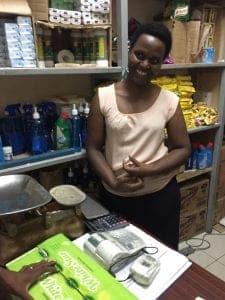In many respects, Rwanda is a world leader in gender equality: it ranks #1 in the world for women’s representation in the legislature and labor force participation, according to the World Economic Forum’s Global Gender Gap Report. The country’s president is a prominent signatory and champion of the United Nations’ HeForShe campaign, and has committed Rwanda to achieving gender equality goals around bridging the digital divide, advancing women’s employment opportunities, and eradicating gender-based violence. It is also home to a very conducive environment for women’s financial inclusion: Rwanda’s National Bank has set an ambitious target of 80% financial inclusion by 2017, and has led initiatives to enhance financial capabilities across the country.

However, given the historic lack of focus on the women’s market among Rwanda’s banks, many financial institutions are unsure where to begin. Thus, earlier in 2016, Women’s World Banking received funding from Access to Finance Rwanda (AFR) to develop a strategy for a leading bank in Rwanda to do just that.
Current bank offerings don’t meet women’s needs
Focus groups and interviews with diverse segments of women across Rwanda revealed one of the key reasons banks continue to struggle to reach the women’s market: the fundamental mismatch between the financial products and services offered by banks and the needs of women clients.
Our research team found that banks tend to offer products that meet single use cases, rather than address a client’s financial needs holistically. To access financial services, clients must first visit a branch, where staff offer them whichever product they are assigned to promote, but rarely provide additional information about other services that might be of interest. Since women clients are less likely to feel comfortable approaching the bank and asking questions, they have limited awareness of different bank products and services or how they could benefit – even when she is a satisfied user of one particular product from that bank.
This lack of consideration of women’s specific needs is also visible in credit products, where there is a significant misalignment between collateral requirements and borrowing needs. The individual loans currently offered by Rwanda’s banks require a land or house title as collateral. The value of these assets is typically much larger than the size of the loan, which amplifies fears of borrowing and the risk of losing that important family asset in case the borrower is unable to repay. This is especially true for women, who often seek smaller loans. Women also have particular difficulty pledging such assets, because Rwandan law requires that couples have joint ownership of titles. While this is in some ways quite beneficial to gender equality, it also creates the potential for conflict at home and limited ability to borrow, as husbands may not agree to risk such significant collateral for their wife’s loan.
What women want from their bank
In contrast to the current bank offerings described above, Rwandan women are clear about the three simple things they want from banks:
- A range of financial products and services to meet her various needs
Even low-income women have complex financial portfolios, managing finances across both business and personal and family life. In order to truly serve women clients, banks must consider them holistically and provide a suite of offerings to meet these diverse needs. Included in banks’ offerings should be non-financial services such as training and networking opportunities, which are very attractive to women clients in particular.
- Banks to approach her and explain their products and services and how she can benefit
Rwandan women want a bank representative to take the time to visit their businesses and explain the different products and services the bank offers, as well as the processes for accessing and using those products. Rather than just coming to “sell” whatever promotion the bank is promoting that month, women clients want to feel the bank values a relationship with them as clients and can offer them benefits meaningful to their unique financial needs.
- The ability to borrow the right amount, within her means
Women clients want loan products tailored to circumstances, based on their specific business or household needs, rather than a cookie-cutter credit offering. These loans must also have collateral requirements that women clients have the ability to pledge and that are proportional to the size of the loan.
The way forward
Meeting the needs of women clients represents a tremendous market opportunity for Rwandan banks. While there are multiple banks, mobile network operators, and other financial institutions in Rwanda with promising women-focused initiatives, none has yet emerged as a clear leader in effectively serving women clients. Rwandan banks can leverage their existing institutional capacity and the country’s conducive regulatory environment to reach Rwanda’s 2.6 million unbanked women, benefiting the banks’ bottom lines as well as women clients, their families, and communities.



